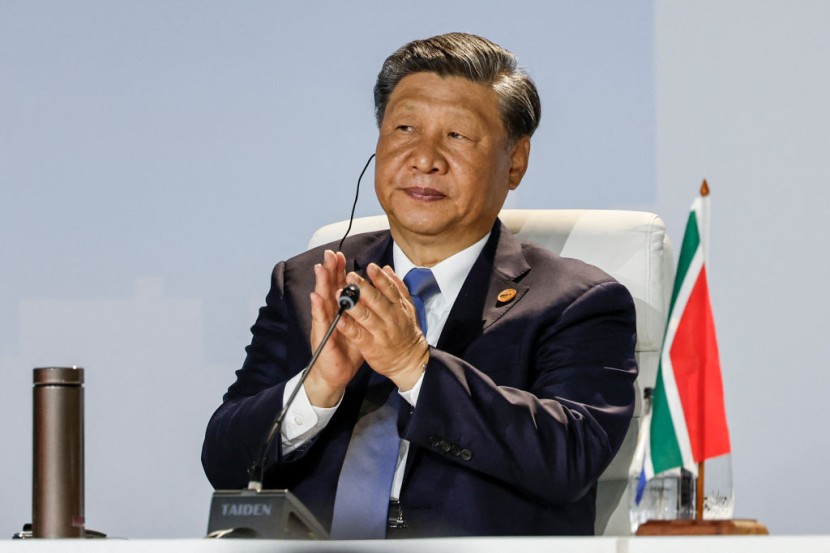
China's leader, Xi Jinping, surprised international observers by unexpectedly skipping a scheduled speech at a crucial multilateral business forum held in South Africa as part of the Brics summit.
The incident has sparked speculation and concern, given the highly choreographed nature of such events and Xi's usual public appearances.
Xi Jinping's Missing Speech
This absence comes amid a climate of uncertainty regarding China's intentions and its global strategies. Xi Jinping arrived in Johannesburg for the Brics summit, a gathering of leaders from Brazil, Russia, India, China, and South Africa, on a rare international trip.
It was only his second outing of the year, the first being a visit to Moscow in March. The significance of his absence from international stages in recent months is not lost on observers, as it deviates from his typical level of engagement.
Scheduled to address the multilateral business forum on Tuesday, Xi was conspicuously absent from the podium. Instead, his speech was delivered by Wang Wentao, the commerce minister. Xi later participated in the summit dinner, leaving many to wonder about the reasons behind his unanticipated absence.
The decision seemed last-minute, evident from state media articles and social media posts that had been prepared as though Xi would deliver the speech in person.
In light of Xi's unusual absence, speculation and conjecture have arisen. Some China watchers and analysts have questioned whether there might be an underlying issue, possibly health-related or a matter of internal politics.
Given China's propensity for secrecy in matters concerning leadership and internal dynamics, any concrete explanation is unlikely to emerge. Bill Bishop, the author of the prominent newsletter "Sinocism," highlighted that Xi had already been notably absent from public view for an extended period earlier in the month, which itself had raised eyebrows.
The sudden decision to forgo the business forum has only fueled more speculation. In the absence of official information, rumors and theories are filling the void. Xi's absence from such a highly orchestrated event is indeed striking. The Brics summit holds significance for China as it seeks to build alliances with other major emerging economies to counterbalance western blocs like the G7 and G20.
The absence of the Chinese leader, who typically exudes a strong presence in such gatherings, adds to the intrigue surrounding China's intentions and strategies. The delivered speech contained thinly veiled criticism of an unnamed country, which was interpreted as a swipe at the United States.
The address accused this country of pursuing hegemony and obstructing the progress of emerging markets and developing nations. These statements echo China's stance on global power dynamics and its drive to position itself as an alternative to traditional western dominance, according to The Guardian.
Global Implications of China's Absence
The Brics summit brings together nations representing approximately 40% of the world's population and a quarter of the global GDP. As a forum for emerging economies to collaborate and advocate for their interests on the global stage, the absence of China's leader raises questions about the unity and coherence of the group.
China, with its economic might and political influence, plays a pivotal role in the collective aspirations of Brics. China's strategy of expanding its influence beyond its borders is evident through its initiatives like the Belt and Road Initiative (BRI), which seeks to create trade and infrastructure networks connecting Asia, Europe, and Africa.
Its efforts to strengthen the Brics grouping can be seen as a complementary approach to reinforce its global standing and push back against the dominance of western-led institutions. While China is eager to bolster Brics as a counterweight to western institutions, divisions within the group itself are evident.
Brazilian President Luiz Inácio Lula da Silva explicitly stated that the group's intention is not to compete with western entities. India, another significant member of Brics, has a complex relationship with China and remains cautious about empowering Beijing through this platform.
India's reservations are grounded in its geopolitical concerns, especially given the longstanding border disputes and diplomatic tensions with China. These reservations underline the delicate nature of relationships within the Brics group and underscore the complexity of China's efforts to position itself as a unifying force among diverse economies.
Xi Jinping's unexpected absence from the Brics summit's business forum has ignited speculation about the reasons behind this departure from protocol. As China seeks to expand its global influence and assert itself as a prominent player in international affairs, its actions and behaviors on the global stage are closely scrutinized.
The incident highlights the challenges of deciphering China's intentions and strategies, given its propensity for secrecy and tight control over information.
While no concrete explanations have emerged, the absence itself sends ripples through the international community, prompting questions about the future direction of Chinese leadership and its global ambitions, NBC reported.
Related Article: Russian Mi-8 Helicopter Pilot Defects to Ukraine








